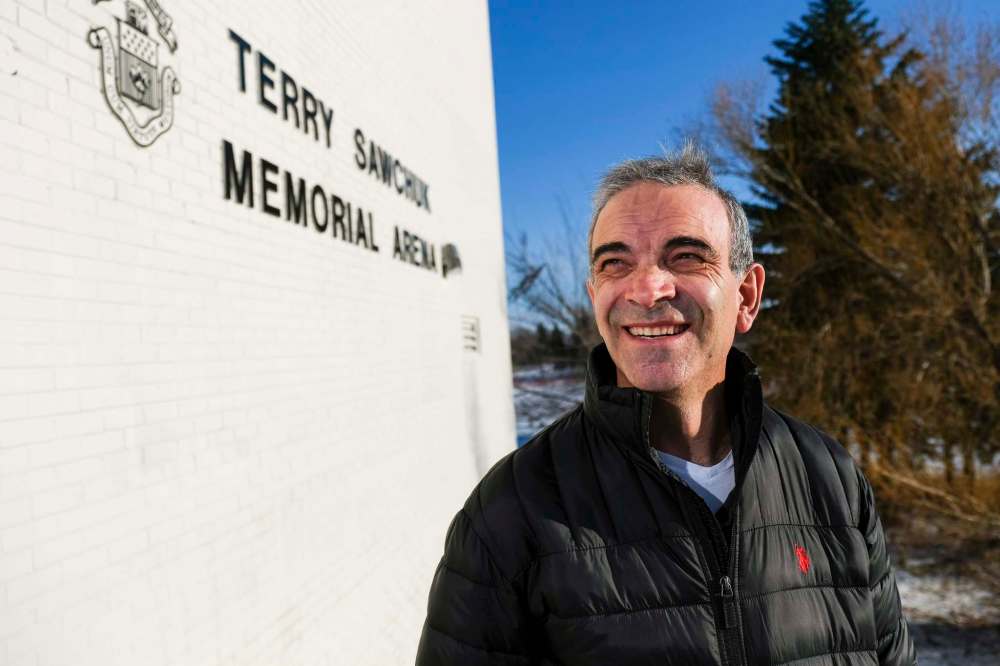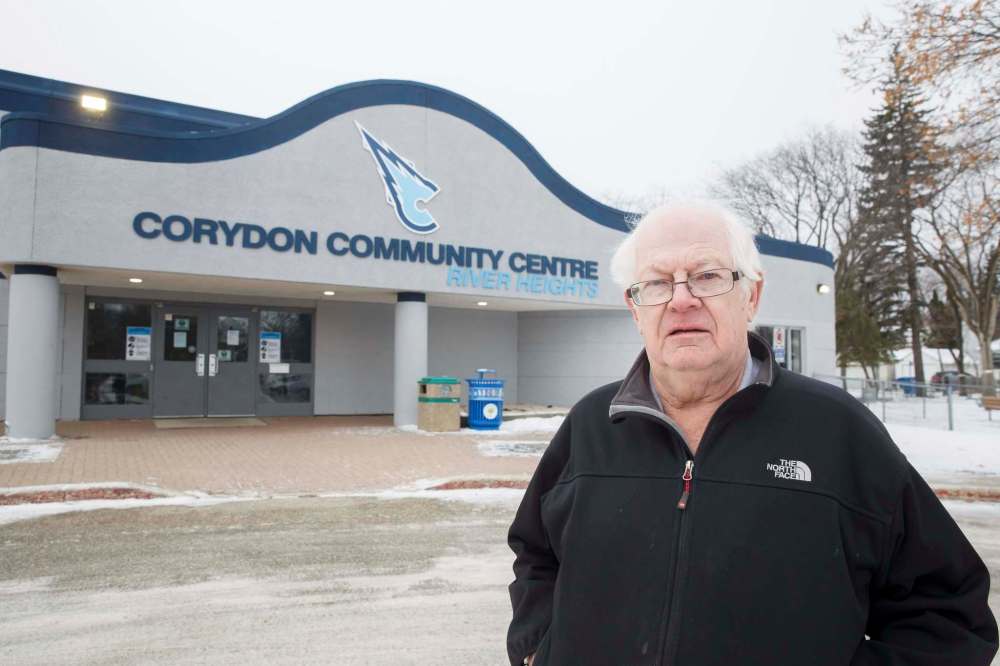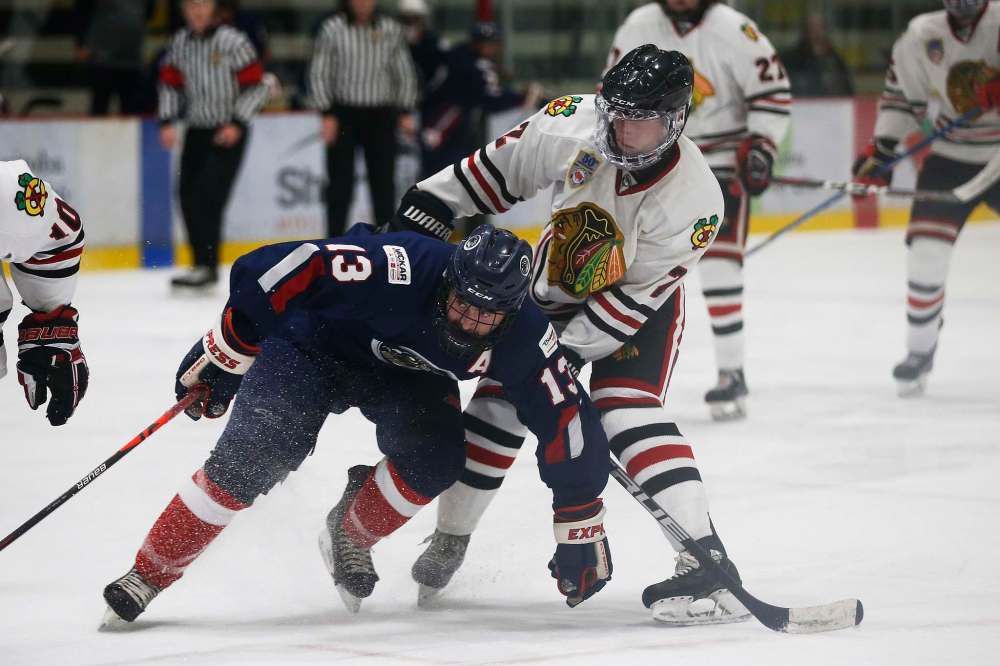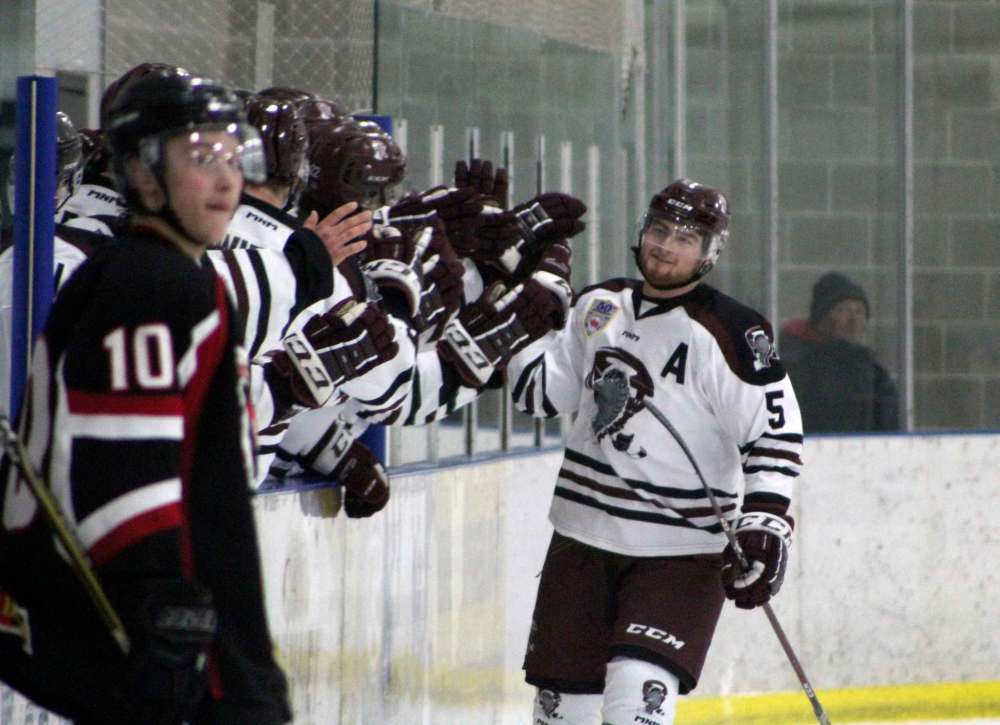The league of gentlemen The golden-anniversary celebrations are on hold, along with Season No. 51, but there's plenty of pride to go around among people connected with the MMJHL
Read this article for free:
or
Already have an account? Log in here »
To continue reading, please subscribe:
Monthly Digital Subscription
$0 for the first 4 weeks*
- Enjoy unlimited reading on winnipegfreepress.com
- Read the E-Edition, our digital replica newspaper
- Access News Break, our award-winning app
- Play interactive puzzles
*No charge for 4 weeks then price increases to the regular rate of $19.00 plus GST every four weeks. Offer available to new and qualified returning subscribers only. Cancel any time.
Monthly Digital Subscription
$4.75/week*
- Enjoy unlimited reading on winnipegfreepress.com
- Read the E-Edition, our digital replica newspaper
- Access News Break, our award-winning app
- Play interactive puzzles
*Billed as $19 plus GST every four weeks. Cancel any time.
To continue reading, please subscribe:
Add Free Press access to your Brandon Sun subscription for only an additional
$1 for the first 4 weeks*
*Your next subscription payment will increase by $1.00 and you will be charged $16.99 plus GST for four weeks. After four weeks, your payment will increase to $23.99 plus GST every four weeks.
Read unlimited articles for free today:
or
Already have an account? Log in here »
Hey there, time traveller!
This article was published 04/12/2020 (1836 days ago), so information in it may no longer be current.
Celebrations planned last spring to mark the end of the Manitoba Major Junior Hockey League’s 50th season had to be shelved, owing to the crushing hit of the COVID-19 pandemic.
A 2019-20 champion wasn’t even declared, a first in the 10-team league’s long and colourful history.
Now, there’s obvious uncertainty about the rest of the 2020-21 MMJHL campaign, which began with the puck drop between the host Charleswood Hawks and Transcona Railer Express at Eric Coy Arena on Oct. 13 but was paused 17 days later as Winnipeg moved to critical code-red level public-health restrictions.
It’s been a frustrating stretch, indeed, as the Hawks, Railer Express, River East Royal Knights, Stonewall Jets, Pembina Valley Twisters, St. Boniface Riels, Fort Garry/Fort Rouge Twins, St. Vital Victorias, St. James Jr. Canucks and Raiders Jr. Club have played only a handful of games apiece to begin the 51st season.
From playing with River East buddies to a storied career on European ice

Posted:
From playing with River East buddies to a storied career on European iceBruno Zarrillo had no inkling a two-year stint in the Manitoba Major Junior Hockey League would be the passageway to a long and successful professional career overseas.
Yet, in the grand scheme of things, it’s a minor inconvenience during a global pandemic for a league that has hurdled plenty of obstacles over the past six decades, yet has continued to provide players age 17-21 with a well-established, vibrant place in which to compete.
Many of those athletes — even with a competitive fire still glowing inside — might well have bid adieu to hockey, had it not been for the availability of the MMJHL and its many community teams over the years.
“They must be doing something right,” one of the league’s founding fathers, Jack McKenzie, aptly stated during a recent telephone chat with the Free Press. “I’m amazed it’s still around after more than 50 years, but then again, not really. It’s been a wonderful place for young men to play hockey while they’re starting to find their place in life. I’ve been proud to be a part of it.”
McKenzie, now 78, served as the league’s first president, overseeing a six-team loop during the inaugural 1970-71 campaign that included the River Heights Cardinals, a squad from his own neighbourhood that he helped run, in addition to the Hawks, Fort Garry Blues, Stonewall Rockets, St. James and Portage la Prairie.

Running the show now is Kerry Lines, in his fifth season as president. He helped establish the Twisters organization with Glenn Cordy in 2001 and ran the franchise for 14 seasons.
The pair had coached high school hockey in Sanford but were well aware those players were at a crossroads when they graduated.
“Those kids had nowhere to play the following year, outside of the Winkler Flyers (of the Manitoba Junior Hockey League). If one made it, there were 10 that had no place to go. You compound that with all the schools across Pembina Valley and there was a big need for another program,” Lines said.
“I’ve been involved now 20 years and I can’t say enough about this league. The 10 member teams are in it for the right reasons, and that’s to support the young students or the kids that are starting their working careers. It’s a league that’s flexible to those that are in university and really caters to that age group…
“To see these kids come and mature in our league and then go off and have careers and families, it’s really gratifying. I’m super-proud to be a part of it and I think this league is poised to be around another 50-plus years.”
However, the MMJHL had what can only be described as a tumultuous creation.
“I’m amazed it’s still around after more than 50 years, but then again, not really.” – Founding father Jack McKenzie
Months prior to the start of the campaign, McKenzie and other team directors from River Heights, Charleswood, Fort Garry and Stonewall met with officials from both the Manitoba Amateur Hockey Association and the MJHL to discuss the province’s hockey landscape and to ensure the two leagues wouldn’t bump heads.
The new league saw itself as junior B level and wasn’t in any way trying to compete with the likes of the MJHL’s St. Boniface Saints, St. James Canadians, West Kildonan North Stars and Selkirk Steelers.
But the MJHL brass envisioned the junior B squads as a “farm system” and that simply wouldn’t fly with McKenzie and the rest of the owners, and they proceeded with an independent league of their own, all supporting a specific philosophy.
“We weren’t trying to send kids to the pros. We wanted to provide a place for kids who came out of juvenile hockey but had no place to play unless they wanted the busy schedule of a Junior A team,” McKenzie said. “Lots of kids didn’t want that because it involved a lot of travel. They wanted to go to university and study, and they just couldn’t do both.”
The Cardinals captured the first league title but would fade from the MMJHL by 1978. McKenzie stayed on as president for six seasons before passing the torch.

The MMJHL championship trophy bears his name.
“It’s a very nice honour,” he said. “We’ve had strong volunteers, good coaches and managers — a league full of good people. If you treat the kids right, they’ll respond to your league, support your league. And we’ve done that. I look at the number of kids that have come through, that have gone on to university. The league has done wonders.”
Tom Miller, 82, the longtime president of the Jr. Canucks, couldn’t agree more.
“It was an opportunity to make sure the St. James boys had a place to play at a higher level, and it was an experience that was unreal. We had backing of sponsors, we played out of the Allard Arena and then moved over to the Civic Centre and we always had a lot of fans in the rink,” Miller said. “I’m still in touch with some of the players that were with us, and it’s nice to hear what they’ve done in life. It’s been a great experience.”
Doctor with fond memories of playing days plans to give back

Posted:
Mackenzie Acheson could well be the poster boy for everything the Manitoba Major Junior Hockey League has tried to exemplify since its founding in 1970.
Charleswood has won 16 MMJHL crowns, most of any current squad in the league. The Royal Knights and Twins have seven titles apiece, St. Boniface owns five, while the Raiders and Twisters both have three.
Pembina Valley remains the reigning champion after defeating the Canucks in a thrilling final series, played nearly 19 months ago. The Twisters completed an improbable comeback in late April 2019, scoring five unanswered goals in the second half of Game 7 to register a 5-4 victory over St. James.
Stonewall, St. Vital and St. James each has a lone championship, while the Railer Express, founded eight years ago, are looking for their first.
Miller recalls every detail of the Jr. Canucks’ sensational run to the championship in 1998, even a few he didn’t see with his own eyes.
“I remember the seventh game against the Hawks (in the final) and there was about a minute left and we were trailing. I couldn’t take it anymore and walked out and sat down in the hallway. There was a big roar and all of a sudden someone comes by and says, ‘Miller, they just tied the game,’” he said. “Then it went into overtime and we won, and it was amazing. I never thought, honest to gosh, it would happen.
“The goaltender, Kris Fillion, was unreal and he was the MVP of the playoffs. He won it for us, whether you like it or not. It was Kerry Ross who scored in overtime. I loved every one of my teams but that one stands out. They came together when it was crucial.”
Charleswood had claimed four consecutive championships (1993-97) before the drive for five was snapped by St. James. The Hawks went on to win four in a row again (2008-12) while the Royal Knights matched the feat years earlier (1986-90).
“One of my assistant coaches asked me why I still do it. My response was, ‘Somebody has to.’ It’s too important for the community. It’s hard to let go.” – Barry Bonni
Barry Bonni, the River East organization’s driving force for nearly 40 years, said it’s not the championship banners that are most gratifying.
“One of my assistant coaches asked me why I still do it. My response was, ‘Somebody has to.’ It’s too important for the community. It’s hard to let go,” said Bonni, the club’s president and general manager for the last 20 years. Two of his sons, Ryan and present head coach Blake, have worked behind the bench. “I’ve produced more engineers, lawyers and police officers than I have hockey players. That’s not what this was ever about.”
Mike Ashley spent 24 years with the Twins before stepping aside after the 2018-19 season. He’s admitted he misses being around the quality players the league attracts.
“They’ve made a life decision that they are going to play hockey but also go to school or work. I’ve had doctors, lawyers, plumbers, electricians, teachers, from all facets of life on my team. They are unsung, no one hears about these boys. They are contributing members of the society,” he said.

“The best feeling I get to this day is someone comes up to me and says, ‘Mike, how’s it going?’ And you vaguely remember them because over 20 years you have a lot of players coming through. But they say, ‘It’s me, Johnny So and so, and I played for you in 2000-whatever. I’m married, I have two kids, I’m a dentist, a plumber, or I own my own business.’ It’s really something special.”
One of the league’s current stars, Elijah Carels, is content to help out on his family’s cattle and grain farm near Bruxelles, about 160 kilometres southwest of Winnipeg, while picking up some carpentry work on the side.
The 21-year-old forward had spent big chunks of four seasons with Pembina Valley and was wearing the C in this his fifth and final year before the league shut down last month.
Carels bounced around in the Alberta and Saskatchewan junior leagues as an 18-year-old before returning home to play for the Twisters, making the 90-minute drive to the rink in Morris with a few teammates, including his younger brother Jacob a few times a week for practices and games.
“When I went there (Twisters) it was pretty surprising, just a lot of guys that were the exact same as me, players that wanted to stay close to home, go to school or work but still play a good level of hockey.” – Elijah Carels
“After I got traded for the second time to La Ronge (four hours north of Saskatoon) it got to the point where I didn’t want to move around anymore. That’s not the life I wanted. So, I came back and played for the Twisters,” Elijah said. “When I went to the Twisters, 16 of the guys I had either played with before or knew of them. It was pretty refreshing knowing I knew so many faces going in.
“I really didn’t have any idea of what it would be like, because when I was growing up the MMJHL was pretty far away from where I lived. But when I went there it was pretty surprising, just a lot of guys that were the exact same as me, players that wanted to stay close to home, go to school or work but still play a good level of hockey.”
Elijah was instrumental in the Twisters’ run to the playoffs during the 2018-19 season but was sidelined for the championship series against St. James after suffering a broken collarbone in the second round. Last year, he won the league scoring title (38G, 44A) and was named most valuable player during the shortened 2019-20 season.
He’s far from ready for his MMJHL career to be over, and he’s crossing his fingers for the resumption of play early in the new year.
“That competitive feeling doesn’t just go away,” he said. “You still have that adrenaline rush every time the puck drops.”
jason.bell@freepress.mb.ca
Twitter: @WFPJasonBell

Jason Bell wanted to be a lawyer when he was a kid. The movie The Paper Chase got him hooked on the idea of law school and, possibly, falling in love with someone exactly like Lindsay Wagner (before she went all bionic).
Our newsroom depends on a growing audience of readers to power our journalism. If you are not a paid reader, please consider becoming a subscriber.
Our newsroom depends on its audience of readers to power our journalism. Thank you for your support.







